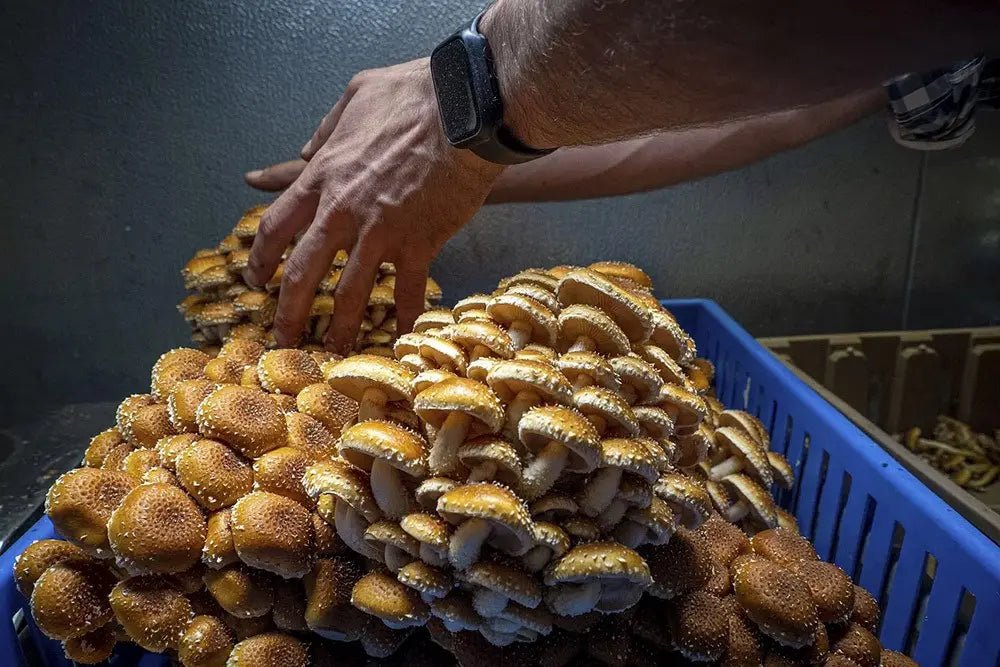
Chestnut Mushroom Substrate Recipe
Share
Chestnut Mushroom Substrate Recipe: Crafting the Perfect 10-Pound Mix
Chestnut mushrooms (Pholiota adiposa) are a delightful gourmet variety known for their nutty flavor and meaty texture. Whether you're a beginner or an experienced grower, creating the right substrate is crucial for successful cultivation. In this guide, we'll walk you through preparing a perfect 10-pound batch of Chestnut mushroom substrate, ideal for home growers or small-scale operations.
Understanding Chestnut Mushroom Substrate
Chestnut mushrooms naturally grow on hardwood trees, particularly beech, so our substrate will mimic this environment while providing optimal nutrition for fast and healthy growth. The ideal Chestnut mushroom substrate should have:
- A proper balance of carbon and nitrogen
- Adequate moisture content
- The right pH level
- Good aeration
Ingredients for 10 Pounds of Chestnut Mushroom Substrate
- 7.8 lbs (3.54 kg) of hardwood sawdust (preferably beech, oak, or maple)
- 2 lbs (907 g) of wheat bran
- 0.1 lbs (45 g) of sugar
- 0.1 lbs (45 g) of gypsum
- Approximately 5-6 liters (1.3-1.6 gallons) of water
This recipe follows the common ratio for Chestnut mushrooms: 78% hardwood sawdust, 20% wheat bran, 1% sugar, and 1% gypsum. The hardwood sawdust forms the base, mimicking their natural habitat. Wheat bran serves as a nitrogen-rich supplement, providing extra nutrients for vigorous mycelial growth. Sugar adds an easily accessible energy source, while gypsum helps maintain proper pH levels and improves the substrate's structure for better air exchange.
Equipment Needed
- Large mixing container (at least 5-gallon capacity)
- Scale for weighing ingredients
- Clean mixing tools (large spoon or small shovel)
- pH meter or pH strips
- Measuring cups or a graduated container for water
- Mushroom grow bags with filter patches
- Pressure cooker or large pot for sterilization
- Personal protective equipment (gloves, mask, and safety glasses)
Step-by-Step Substrate Preparation
1. Prepare the Hardwood Sawdust
If using sawdust pellets, add water directly to the pellets and mix until they break down into sawdust. If using loose sawdust, ensure it's not too fine or too coarse - a mix of particle sizes is ideal.
2. Mix Dry Ingredients
In your large mixing container, combine:
- 7.8 lbs (3.54 kg) of hardwood sawdust
- 2 lbs (907 g) of wheat bran
- 0.1 lbs (45 g) of sugar
- 0.1 lbs (45 g) of gypsum
Mix these ingredients thoroughly, ensuring even distribution of all components throughout the sawdust.
3. Hydrate the Substrate
Chestnut mushrooms prefer a substrate with 60-65% moisture content. Gradually add about 5 liters (1.3 gallons) of water to your dry mix, stirring continuously to ensure even distribution.
Perform the "squeeze test" to check moisture content:
- Take a handful of the mixture and squeeze it firmly.
- A few drops of water should come out, and the substrate should hold its shape when you open your hand.
- If water streams out, it's too wet - add more dry ingredients.
- If no water comes out and it doesn't hold shape, it's too dry - mist with clean water and mix again.
4. Check and Adjust pH
Chestnut mushrooms prefer a slightly acidic environment. Use your pH meter or pH strips to test the substrate's pH level. Aim for a pH between 5.5 and 6.5.
- If the pH is too high, add a small amount of elemental sulfur.
- If it's too low, add a small amount of agricultural lime.
Make adjustments in small increments, mix well, and retest before adding more.
5. Load the Substrate into Grow Bags
Fill your mushroom grow bags with the substrate. Each bag should hold about 5 lbs (2.27 kg) of substrate. Lightly compress the substrate to remove air pockets, but don't pack it too tightly.
Fold the top of the bag over, creating a clean surface for sealing after sterilization.
6. Sterilize the Substrate
Chestnut mushrooms require fully sterilized substrate to prevent contamination:
- Place your filled bags in a pressure cooker or large pot.
- If using a pressure cooker, sterilize at 15 PSI for 2.5 hours.
- If using a large pot, steam sterilize for 4-6 hours, ensuring the internal temperature reaches and maintains at least 200°F (93°C).
- After sterilization, allow the bags to cool completely before handling. This usually takes 8-12 hours.
Conclusion: Ready for Inoculation
Congratulations! You've now prepared a perfect 10-pound batch of substrate for growing Chestnut mushrooms. Your sterilized bags are ready for inoculation with Chestnut mushroom spawn.
Remember, Chestnut mushrooms prefer cooler temperatures for fruiting. After inoculation and colonization (which takes about 2-4 weeks at 68-75°F or 20-24°C), you'll need to provide a cooler environment (50-60°F or 10-16°C) to initiate fruiting.
Each batch of substrate you prepare will teach you something new, allowing you to refine your technique over time. Happy growing!
